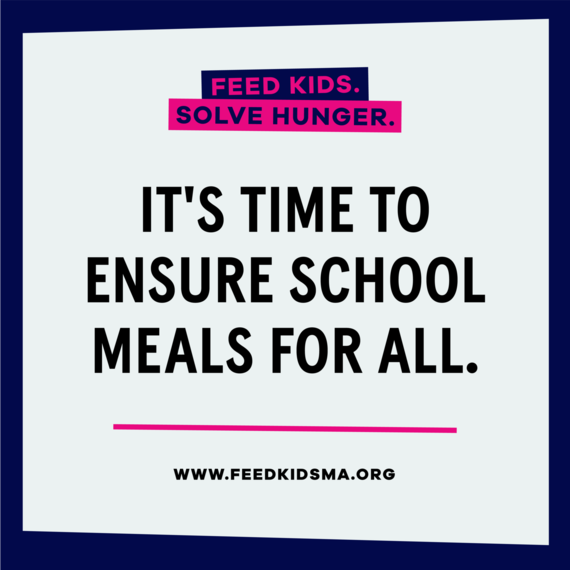Project Bread Launches School Meals for All Legislation
Project Bread
Let's end childhood hunger. By starting with what happens in our schools!
Project Bread has joined forces with some of our most influential and dedicated anti-hunger partners & allies to launch the Feed Kids Campaign. The Feed Kids Campaign is a state-level legislative campaign in support of School Meals for All - also known as Universal School Meals - for Massachusetts students.
For the past 10 months, thousands more Massachusetts children and teens have been able to get free breakfast and lunch at hundreds of meal sites across the Commonwealth. Because of the effects of the pandemic, traditional barriers that kept many students from participating in school meal programs have been temporarily waived.
Without state level legislation in place, there’s a possibility that these barriers will return once the waivers expire post-pandemic. That means returning to a situation like the one represented in 2018, where 27 percent of children experiencing food insecurity in Massachusetts could not get free or reduced-price meals through school meals programs.

To keep school meals accessible for all students, The Feed Kids Coalition—led by Project Bread, with support from the faith community, anti-hunger partners, health care advocates, school and municipal officials, food systems experts, children’s advocates and more—joined with bill sponsors Senator Sal DiDomenico and Representative Andy Vargas to file legislation on Monday, February 2, 2021 for School Meals for All.
With School Meals for All, we have an opportunity to take a critical step toward ending childhood hunger in our state by ensuring that every student receives the nutrition they need while they are in school. This would allow every student who wants or needs a school breakfast or lunch to receive it—at no cost to their family and with no requirement to sign up or provide income or other information.
Just as no student is required to pay fees at public schools when they enter the classroom, there will be no financial barrier in the school cafeteria.
For families still struggling because of the pandemic and financial uncertainty, access to free school meals is crucial to help lighten the family grocery budget. Many families, however, have been experiencing food insecurity long before the pandemic hit.
Rebecca Wood, a mother in Revere, struggled with school meal debt among other costs before the pandemic. “I feel like I’m in a boat with a small hole in it,” says Wood. “Free school meals give me breathing room. I now have more money for Charlie –my daughter’s –clothing or the electric bill.”
“Our priority in Massachusetts, must be to feed our kids, full stop, and School Meals for All will do that,” says Erin McAleer, CEO of Project Bread.
“Our priority in Massachusetts, must be to feed our kids, full stop, and School Meals for All will do that,” says Erin McAleer, CEO of Project Bread. “Now more than ever, we need to be intentional about meeting the basic needs of students. We’ve seen during the pandemic that it’s possible to expand access to school meals for the benefit of all children. Every child and every community is better off when all students are nourished and ready to learn. Massachusetts has the opportunity right now, to invest in the health and future of our kids, and to lead the nation in providing School Meals for All. It’s a necessary step to solving hunger permanently.”
Senator Sal DiDomenico notes that “Even before the COVID-19 pandemic, too many in our Commonwealth were struggling to meet their most basic needs. Today, the COVID crisis has shed a stark light on the state of hunger in Massachusetts, especially for kids, with one in five households with children being food insecure. That is unconscionable. We have a moral responsibility to take immediate action to end childhood hunger in Massachusetts, and we simply cannot do so without providing universal school meals to every child, free of charge.”
“Food is an essential element to educational equity,” acknowledges Representative Andy Vargas. “We can invest all our resources into a school, but if students aren’t eating they won’t be able to take full advantage of school curriculum and programming. We don’t ask any students to pay for desks, so why do we ask them to pay for meals? In a time where more than 1 in 4 food insecure student’s do not qualify for free and reduced lunch, we must act with urgency to remove barriers and stigmas that keep kids hungry.”
Join us on our campaign
Hungry kids need your help
Email your legislators asking them to support our bill, post on social, or join the Feed Kids Coalition!